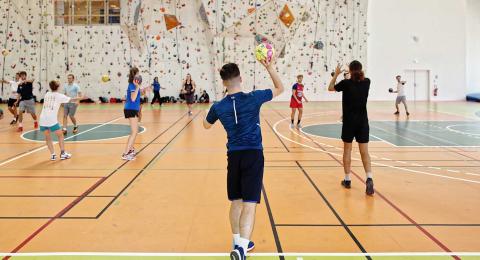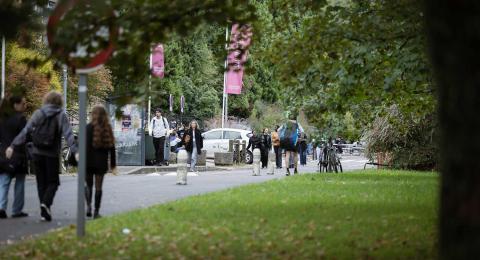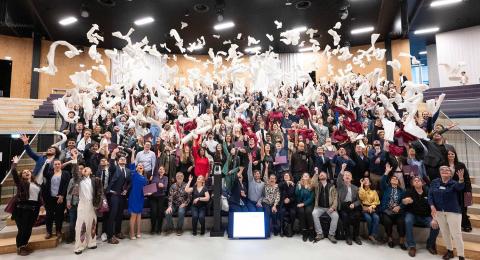High-level training, as close as possible to the latest technologies, in close collaboration with industry and nationally and internationally recognized research laboratories in the field of autonomous systems and intelligent vehicles.
The SAM Master's degree covers the entire "perception, decision, action" cycle, including the "communication" and "interface" aspects between the control center and the operating part. The curriculum has two main focuses: the first, focused on "control," is aimed at engineers with strong skills in advanced automatic systems. The second, focused on "perception," deals with using and combining multi-sensorial information from various embedded sensors.
The program is supported by the IBISC laboratory, which is associated with the UFR Sciences and Technologies of the University Evry Paris-Saclay. The teaching staff conducts research on aerial or land transportation issues, on aeronautic or spatial robotics, in the following disciplines: modelling and simulation, automatic (control, fault diagnosis), signal and image processing, embedded IT.
Information
Objectives
The goal of the SAM Master's program is to enable students to master the concepts, models, and techniques required for the design, development, and control of autonomous mobile systems (land and air vehicles, mobile robots, etc.).
Upon completion of the program, students will be able to:
• Implement a "systems" approach to concrete engineering problems in innovation fields,
• Master the entire functional chain combining sensors, actuators, and effectors, as well as the hardware and software architectures of the interfaces between the different elements of an automated system,
• Master software-hardware simulation and rapid prototyping tools,
• Acquire a cross-disciplinary vision while maintaining an excellent scientific foundation in the automation of embedded systems, enabling the design, testing, implementation, and validation of control methods,
• Acquire in-depth knowledge of embedded signal processing,
• Be able to exploit the output signals of embedded sensors, combine them, and merge the higher-level information synthesized from these signals,
• Acquire the necessary foundations for processing discrete two-dimensional signals from camera-type sensors (image) and be able to design and integrate high-level perception algorithms,
• Having a strong sense of analysis and observation,
• Having listening, communication, and teaching skills,
• Fluency in scientific English.
Career Opportunities
Career prospects
Après un Master ou Master + Doctorat : chercheur ou enseignant-chercheur
Ingenieur R&D
ingénieur étude conception
Consultant
Ingénieur d’études dans les domaines de l’industrie
Ingénieur d’études dans les domaines de la recherche
Ingénieur d'études industrie / recherche publique
Enseignants-chercheurs
Further Study Opportunities
Doctorat
École d’ingénieur
Mastère spécialisé
Thèse de doctorat
Les diplômés peuvent être recrutés par voie de contrat de travail, de droit privé ou de droit public, mais peuvent aussi s'orienter vers les concours des fonctions publiques et des concours ou examens professionnels
Les étudiants titulaires d’un M2 ont la possibilité de poursuivre dans la recherche en doctorat
Les étudiants de cette mention peuvent se tourner vers la recherche à l’issue du M2
ngénierie études, recherche et développement
Ingénierie études, recherche et développement
former des spécialistes de niveau international, produisant des travaux compétitifs au sein d’équipes reconnues des établissements publics à caractères scientifique et technologique (EPST), INSERM et CNRS en particulier
Son enseignement approfondi en statistique, apprentissage automatique et mathématiques appliquées fournit aux étudiants les bases solides nécessaires pour poursuivre en thèse
la formation permet également aux étudiants d’intégrer directement le monde de l’entreprise à l’issue du diplôme, dans des postes tels que Data Scientist, Data Analyst ou Ingénieur Machine Learning
Chef·fe de projet/de mission
Chargé·e de développement
Chargé·e d’études
Fees and scholarships
The amounts may vary depending on the programme and your personal circumstances.
Capacity
Available Places
Target Audience and Entry Requirements
Students who have completed the first year of a Master's degree, 3rd-year engineering school students, or international students with an engineering degree or an M2, in the following fields:
- GEII (Electrical Engineering, Industrial IT)
- Informatics
- EEA (Electronics, Electrical Engineering, Automation)
- E3A (Electronics, Electrical Energy, Automation)
- Signal and image processing
- Automation and Vehicle/Robotics
Application Period(s)
From 30/01/2026 to 31/05/2026
Supporting documents
Compulsory supporting documents
Rank of previous year and size of the promotion.
Copy diplomas.
Motivation letter.
All transcripts of the years / semesters validated since the high school diploma at the date of application.
Curriculum Vitae.
Detailed description and hourly volume of courses taken since the beginning of the university program.
Additional supporting documents
Certificate of French (compulsory for non-French speakers).
VAP file (obligatory for all persons requesting a valuation of the assets to enter the diploma).
Document indicating the list of local M2 choices available here : https://urlz.fr/i3Lo.
Supporting documents :
- Residence permit stating the country of residence of the first country
- Or receipt of request stating the country of first asylum
- Or document from the UNHCR granting refugee status
- Or receipt of refugee status request delivered in France
- Or residence permit stating the refugee status delivered in France
- Or document stating subsidiary protection in France or abroad
- Or document stating temporary protection in France or abroad.









